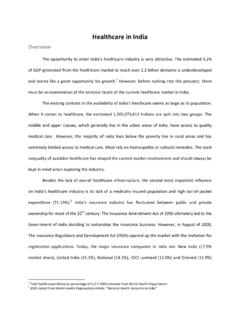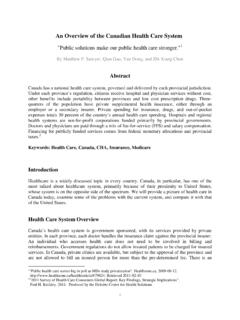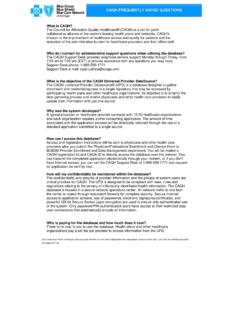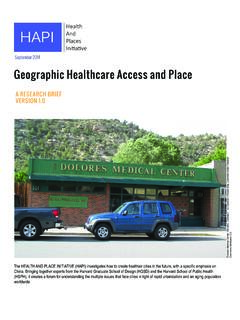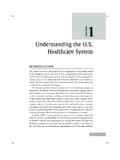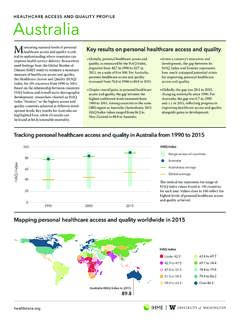Transcription of The UK Health Care System - Columbia University
1 The UK Health care System Josh Chang, Felix Peysakhovich, Weimin Wang, Jin Zhu UK Healthcare System Overview The United Kingdom is a sovereign state located off the north-western coast of Europe. The country includes the island of Great Britain, the north-eastern part of the island of Ireland and many smaller islands. It has a population of 62,262,000 people and a reported GDP of $ trillion Great Britain Pounds. The United Kingdom provides public healthcare to all permanent residents, about 58 million people. Healthcare coverage is free at the point of need, and is paid for by general taxation. About 18% of a citizen s income tax goes towards healthcare, which is about of the average citizen s income.
2 Overall, around percent of the UK's gross domestic product is spent on healthcare (an amount of around trillion GBP). UK also has a growing private healthcare sector that is still much smaller than the public sector. History of UK Healthcare System The National Health Service (NHS) was founded in 1946, and is responsible for the public healthcare sector of the UK. Before this, healthcare in UK was generally available only to the wealthy, unless one was able to obtain free treatment through charity or teaching hospitals. In 1911 David Lloyd George introduced the National Insurance Act, in which a small amount was deducted from an employee s wage and in return they were entitled to free healthcare.
3 However this scheme only gave healthcare entitlement to employed individuals. After the Second World War, an endeavor was undertaken to launch a public healthcare System in which services were provided free at the point of need, services were financed from central taxation and everyone was eligible for care . A basic tripartite System was formed splitting the service into hospital services, primary care (General Practitioner s) and Community Services. By 1974 concerns over problems caused by the separation of the three primary areas of care had grown, so a drastic reorganization effort was made which allowed local authorities to support all three areas of care .
4 The Thatcher years saw a restructuring of the management System , and in 1990 the National Health Service and Community care Act was passed, which set up independent Trusts that managed hospital care . Continued reformation has occurred since the time of the Blair government, including the formation of NHS Direct, which aimed to improve healthcare standards and lower costs and waiting times. Recent changes in the NHS include the dissolving of the current government management structure by 2014, which would put some 30,000 administrators out of work. Also, 80% of the NHS budget will be turned over to doctors to have them spend as they see fit. The purpose of this reform is to encourage the ongoing privatization of the healthcare industry in order to give more choices to the patients.
5 The reforms are put in place to help lower medical costs and patient waiting times. Trends and Developments Since the 1980s, total healthcare expenditure as a percentage of GDP has in general trended up. Also, the private sector for Health insurance has taken on a more prominent role, accounting for about of healthcare spending in 1999, up from in 1980. According to a report by Towers Watson, medical trend rates in 2006, 2009, 2010 and 2011 were , , and , respectively. In the 1990s, the UK government put into effect one of the most significant changes for the NHS in recent times by creating the internal market. Doctors must now be part of the internal market (later, the NHS Trust) to be able to compete for patients.
6 These markets were independent organizations that were individually managed and that competed with each other. It started with 57 trusts and by the mid 90s all healthcare in the UK was provided through these trusts. In 1998, UK instituted the NHS Plan, which helped modernize the NHS. Up until this point, the NHS was operating using a 1940s System in a 21st century world. The System was lacking in national standards; it lacked incentives and means to improve performance and it over-centralized and took power away from the patient. Current Healthcare System in UK The UK has a government-sponsored universal healthcare System called the National Health Service (NHS).
7 The NHS consists of a series of publicly funded healthcare systems in the UK. It includes the National Health Services (England), NHS Scotland, NHS Wales and Health and Social care in Northern Ireland. Citizens are entitled to healthcare under this System , but have the option to buy private Health insurance as well. The NHS Plan promises more power and information for patients, more hospitals and beds, more doctors and nurses, significantly shorter waiting times for appointments, improved healthcare for older patients, and tougher standards for NHS organizations. The UK's Health care System is one of the most efficient in the world, according to a study of seven industrialized countries.
8 The Commonwealth Fund report looked at five areas of performance - quality , efficiency, access to care , equity and healthy lives, The Netherlands ranked first overall, closely followed by the UK and Australia. UK performed well when it came to quality of care and access to care . The UK also ranked first in efficiency, which was measured by examining total national spending on healthcare as a percentage of GDP, as well as the amount spent on healthcare administration and insurance. In regards to access to care , the study states: "The UK has relatively short waiting times for basic medical care and non-emergency access to services after hours, but has longer waiting times for specialist care and elective, non-emergency surgery.
9 " Healthcare Systems in Different Regions of UK Healthcare in the United Kingdom is a devolved matter, meaning England, Northern Ireland, Scotland and Wales each have their own systems of private and publicly-funded healthcare, as well as alternative, holistic and complementary treatments. The fact that each country has its own varied policies and priorities has resulted in a number of differences between the systems. Each country provides public Health care to all UK permanent residents, and each also has a private healthcare sector which is significantly smaller than the public sector. Most healthcare in England is provided by the National Health Service (NHS), England's publicly funded healthcare System .
10 Social care services are a shared responsibility between the local NHS and the local government s Directors of Social Services, and falls under the guidance of the Department of Health . Similarly most healthcare in Scotland and Wales are provided by NHS Scotland and NHS Wales, respectively. The majority of healthcare in Northern Ireland is provided by Health and Social care in Northern Ireland, which is still often referred to as "NHS" for convenience. The actual delivery of Health care services is managed by ten Strategic Health Authorities and, below this, locally accountable trusts and other bodies. Healthcare in the United Kingdom is publicly funded, generally paid for by taxation.
